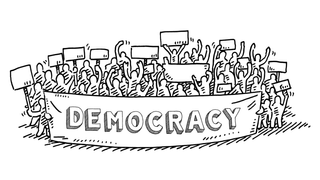In its 2022 public opinion survey, the United States Studies Centre found 64 per cent of Americans and 46 per cent of Australians are concerned by the way democracy is working in the United States. From the controversies surrounding the 2020 presidential election to declining faith in the US Supreme Court, questions about the checks and balances of US democratic institutions and the durability of American democracy are more important than ever.
As part of the USSC Debate Papers series, the Centre invited Brian Klaas, Associate Professor in Global Politics at University College London and a contributing writer to The Atlantic, and Jane Coaston, a contributing writer to The New York Times and former host of the podcast for NYT Opinion ‘The Argument’, to discuss the potential perils and future of American democracy.
American democracy is in grave peril
Brian Klaas
American democracy is in grave peril.
For the past 12 years, I’ve studied the breakdown of democracy and the rise of authoritarianism around the world. I’ve learned that these days, democracy dies differently from how it did in the past. Previously, democracies died with a bang; a split-second assassination, a democracy-killing coup that lasts a few hours, or a revolution that’s over in days. Today, democracies die a slow death, steadily decaying from a chronic, sometimes fatal, illness. America is past the diagnosis stage, but, so far, there’s been little treatment.
There are three serious problems.
First, the Republican Party has transformed into an authoritarian political movement. When Donald Trump was elected in 2016, he faced some pushback from his party. From repealing the Affordable Care Act to investing in US infrastructure, most of his major legislative priorities, with the exception of a sweeping tax bill, were blocked by key votes from his own party. Several prominent Republicans openly denounced Trump for his anti-democratic behaviour and rhetoric.
But once it became clear that the Republican voting base was in lockstep with Trump, elected Republicans faced a choice: fall in line, or fall on their sword. Since then, the party has mostly winnowed out principled pro-democracy conservatives like Liz Cheney and Adam Kinzinger, either through resignations or primary challenges. Extremist authoritarian lackeys, such as Marjorie Taylor Greene, Matt Gaetz, and Lauren Boebert, have become rising stars. That creates a ratcheting incentive structure in the party; authoritarians get rewarded, whereas pro-democracy conservatives who speak out are committing political suicide.
That’s why, despite repeated losses, the party is getting more authoritarian and more extreme. This is partly due to gerrymandering and demographic clustering, in which most elected Republicans win in uncompetitive districts, where the only threat of defeat comes from a fellow Republican who accuses them of being disloyal. On top of that, low-turnout primaries mean that extremist voters pick candidates, and compromise is punished by the hardcore disciples in the Republican base, which creates a heightening effect of increasingly authoritarian politics. Then, within a fragmented media space, junior politicians can become national stars by avoiding governance and instead casting themselves as political influencers, with accompanying wealth and fame. As a result, authoritarians in the modern GOP face stardom; everyone else is sidelined.
So long as the Republican Party represents an authoritarian movement, American democracy will be in peril in every national election.
By early 2021, the Republican Party showed its new colours when 147 Republicans in Congress cast a vote to invalidate the legitimate results of the 2020 presidential election, on the basis of easily debunked lies. This “Sedition Caucus” is still in power. It’s not a fringe movement; it’s the party’s core. One of the members of the Sedition Caucus, House Speaker Kevin McCarthy, is now the third most powerful politician in America.
So long as the party represents an authoritarian movement, American democracy will be in peril in every national election. If, in 2024, the Republicans were to sweep the elections (president, Senate, and House), there would be no serious political check on their ability to systematically dismantle democratic institutions. They’ve already shown a willingness to jettison democracy in pursuit of power; it would be naïve to imagine they wouldn’t try again.
Second, the checks that do exist are counter-majoritarian institutions that are increasingly politicised and widely loathed by citizens. Much attention has rightly been focused on the Electoral College, as the two most recent Republican presidents each won a term of office while winning fewer votes nationally. But the bigger concern is the judiciary.
The conservative majority on the Supreme Court, which will likely persist for decades, is out of step with the citizenry. In late 2022, citizen trust in the Supreme Court hit its lowest point since tracking of it began in 1972. More worrying, citizen trust in the court fell by 20 per cent in just two years. Partisan fights over the court — and the judiciary generally — have intensified, branding judges with the imprint of politics. As we’ve already seen in Hungary and Poland, a politicised judiciary that’s widely distrusted is a serious threat to democracy.
Finally, Trump remains a major threat to American democracy — and he’s on track to be the Republican presidential nominee in 2024. Even if he were to lose, his successor is sure to mimic his authoritarianism, as has already been the case with Florida Governor Ron DeSantis, who has repeatedly used the law for purely political ends. Since leaving office, Trump has grown even more extreme. Recently he has sought to again incite violence on social media by suggesting that his supporters shouldn’t be peaceful if he’s arrested. A second act would be far more dangerous, partly because he’s grown more unapologetically authoritarian, and partly because the Trumpified Republican party would no longer even partially constrain him.
The United States is not on the cusp of dictatorship. But the risks to democracy are real. Unless voters stop America’s descent toward authoritarianism, the democratic death spiral will continue. America needs two parties that are fully committed to democracy. Right now, there’s only one.
American democracy is not in peril (ish)
Jane Coaston
Is American democracy in peril? I say no…ish. Like many Americans, I am worried about the future of American power, both soft and hard, and I am concerned about what Americans believe about democracy. But to ask if American democracy was in peril would necessitate asking, what would it look like if it wasn’t? Was American democracy functioning when George W. Bush won the 2000 presidential election following the Supreme Court’s decision to end the recount of votes in Florida? If not, when did American democracy begin to function again? Or did it? Are we asking if American democracy is functioning or are we asking if we are happy about the results of its functions? It is telling, to me, that we most distrust whether American democracy is functioning correctly when the person we dislike wins office using the same mechanisms we otherwise champion.
Too often we talk about American democracy as an ideal, when to me it is more of a framework — one that can enable both good and bad actors, good and bad acts. Democracy can function even when people I dislike or disagree with — or wouldn’t trust to watch my dog for an afternoon — are elected.
But to ask if American democracy was in peril would necessitate asking, what would it look like if it wasn’t?
When I was in college, I had a job washing dishes in a dining hall that served several dormitories across campus. I washed hundreds, perhaps thousands of dishes, for about 10 hours a week for about four years of my life. Dishes covered in maple syrup because of the free waffle bar, dishes coated in some godforsaken combination of pasta sauce and salad dressing. Dishes upon dishes upon dishes, first hand washed and then fed into an industrial dishwasher that sounded like a jet taking off when turned on. No single experience has altered my perception of politics, people and priorities as much as washing dishes did.
I did not like washing dishes back in college, but the framework of the dish room — everybody had a job to do, and the dishes got cleaned — was one that functioned regardless of my feelings on the subject. But when the dish room itself failed to function, that was when we faced a true crisis. On rare occasions, the dishwasher broke, resulting in expensive repairs and the ceasing of operations in the dining hall. And similarly, I am concerned about what happens if the framework of democracy stops working — or what happens if we simply ignore it.
I believe in the structures that encompass American democracy and American democratic norms, and I believe many of its biggest critics do, too. I even find some hope in how many people advocating anti-democratic efforts that would put American democracy at real risk seem to do so on their belief that they are actually representative of the “demos” and thus are acting on behalf of democracy (I would be truly worried if they didn’t). But that doesn’t lessen my concern that the structures won’t last, not because of terrifying anti-democratic forces but because of the basic issues that can render both a dishwasher and a democracy useless: broken-down parts, overworked people, too much work and too little money aimed at guaranteeing that the things that should work, do.
I’m not worried about the structures of American democracy. I am worried about Americans. They are often underpaid, overworked and exhausted, and they are also the foundations of what democratic functioning really looks like. It is too easy to put process over intent, and many Americans seem to clearly intend for their votes to go to people who believe that democratic norms are not to be respected. They are the people who vote, or refuse to. They are the people who support reforms, or don’t. It is their peril about which I am concerned, not that of democracy.










